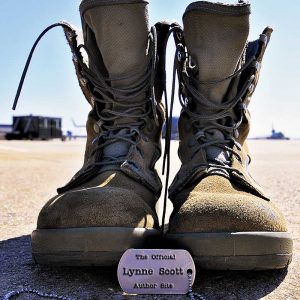I soooo do not write romance. I’ve never once had my characters hearts stopped by the sight of breathtaking beauty or rippling muscles. My men don’t glower and my women don’t flirt from under lowered lashes. My guys don’t wear silk shirts, with tailored slacks that show off their “assets” and most of my gals wouldn’t recognize a Jimmy Choo if you poked her eye out with the stiletto heel of one.
My goal is to write stories about people who are more realistic – people that I might actually meet and would like to be around. I write fiction about two people (both human and vampire) with some type of military connection, who are in some sort of predicament, have to form a partnership to survive, fall in love, there’s some hot fooling around, and then they face the threat together, usually with a couple of cool friends. The sex isn’t the point of the story, it’s just part of the story.
Last year as I was writing Protecting Parker, I wrote myself into a corner and had to write an intimate scene from the hero’s point of view. There are a lot of things that I can imagine, but a man’s point of view during sex isn’t something I’d ever tried before. When I’d done the best I could with it, I called Dean to ask him if he’d read it and see if I got it even close to right. Dean writes – he should be able to help. It was then that I had one of the more unusual conversations in my life.
Me: “I’m not sure I have it right. Would you mind reading it for me?”
Dean: “Well, how long is it?”
Me: “About sixteen pages or so.”
Dean: “Too long.”
Me: “What?”
Dean: “Is he thinking a lot about what’s going on?”
Me: “Well, we’re in his point of view.”
Dean: “No. Is he thinking about how everything feels and comparing it to something else. You know, like about her skin being like silk type stuff?”
Me: “Sure. There’s some of that.”
Dean: “Get rid of all that. Men don’t really think about that kinda stuff when they’re in the moment.”
Me: “What?”
Dean: “Let me give you an example. You buy a new teddy and spend an hour getting ready. Bathing, primping, worrying about whether the color works or if the lace makes you look too fat, and all that other stuff. You walk into the bedroom and the very most a man thinks is, ‘Ooohhh, lace… boobs… lucky.’ Mostly the blood rushes from our brain and we just sorta go into reaction mode.”
The conversation went on for some time as Dean explained that men really don’t think the way we do. He said when it came to thinking, men thought a lot about sex, right up until it happened and then there wasn’t a lot of thinking going on. While we ladies might be evaluating the moment, men have a tendency to be sticking with the basics. A week later, I told him I’d rewritten it and taken out all the emotional content and compound sentences, thereby cutting it by more than half. Then he agreed to read it.
When one of my male beta readers finally read the whole book, he was appreciative that I’d kept things fairly simple. You’ll understand why I’m hiding his identity when you read this. I want you to have respect for my beta readers and this won’t help.
Him: “Thank God, it wasn’t all anniversary sex.”
Me: “What?” (I always ask such concise questions.)
Him: “You know most of the time sex is sorta basic. You really only go for all the fancy stuff on birthdays and anniversaries.”
Me: “Who does?”
Him: “Guys. All the extras aren’t really an everyday thing after the first year or so. You guys don’t show up in the fancy underwear every night and we don’t trot out our best moves. You know, everyday sex is sorta basic, birthday sex is better, and anniversary sex requires your best moves.”
Me: “Um, okay.”
Him: “Too much romance in books just sets men up for failure. We aren’t that sensitive or energetic on a daily basis.”
I’m reminded of the old adage: Never ask a question that you don’t want to know the answer to. So, I’ll ask Dean about computer stuff, Dave about specific weapons, Del about tactics and structure, my other Dave about military and tactical equipment, Gunny about bodyguard stuff, and my cops about cop stuff.
But, now you know why I don’t write romance.

